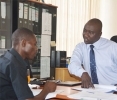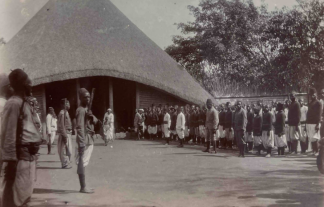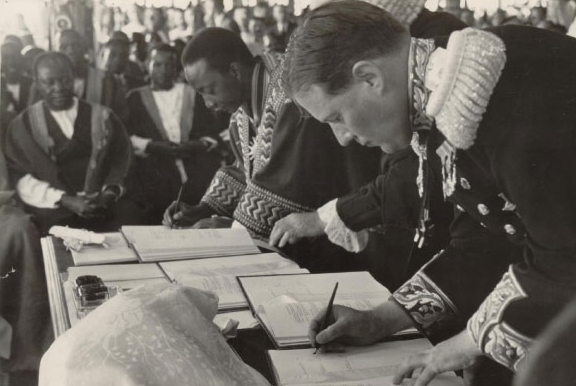OMUZIRO:NGEYE
AKABBIRO
KKUNGUVVU OR
EMMUNYUNGU
OMUTAKA
KASUJJA NKALYESIIWA
OBUTAKA
BUSUJJU
ESSAZA
BUSIRO
OMUBALA
Tatuula asuulumba busuuluumbi
Yazzeemu okuwera ng’Amasiro gano bwe galina okuggwa mu mbeera yonna n’agamba nti, “Nziramu okuwera nti tewali nsonga egenda kutulemesa kumaliriza mulimu guno. Enkuba ketonye, kibuyaga kaakunte, omusana ka gwake, tulina okumaliriza amasiro.”
Bino Katikkiro yabyogedde bwe yabadde alambuza Obuganda omulimu ogukolebwa ku Masiro e Kasubi eggulo ku Ssande n’asiima bonna abali ku mulimu era n’agamba nti omulimu guno gulina okutambuzibwa okusinziira mu mitendera.
Ssentebe w’olukiiko oluvunaanyizibwa ku kuzzaawo Amasiro, Al- Haji Kaddu Kiberu yategeezezza ng’okutusibwa kwa langi ebadde emaze ebbanga eddene ng’erindirirwa bwe kiguddewo essula empya mu kuzzaawo Amasiro gano.
Kaddu yagambye nti “ Essa kwe tutuuse, omulimu guno gusigadde mu mikono gy’abantu babiri ate bonna nga bataka; Kasujja ne Muteesasira era mubadde mugamba nti tubadde tutambudde mpola naye nange ngenda kubakanda ebyetaagisa ebirala okuli essubi, emmuli, amavuvume n’ebirala.
Omutaka Muteesasira Tendo Keeya yagambye nti ttiimu ye ey’Abagirinya yamaze dda okugitendeka era yeetegese okutandika omulimu gw’okulasa akasolya k’enju Muzibu Azala Mpanga ate n’oluvannyuma akwase Wabulakayole ( Omusige okuva ewa Kasujja), omulimu gw’okusereka.
“ Omulimu oguddako muzito era muzibu. Mu mbeera eno gugenda kutambula mpola kubanga eby’obuwangwa tebikubibwamu mavuunya n’olwekyo tulina okugendera mu mitendera,” Omumyuka owookubiri owa Katikkiro era Minisita w’obulambuzi, obuwangwa n’ennono Haji Muhamood Sekimpi bwe yagambye.
Langi ebadde erindiriddwa okuva e Girimani yatuusibwa wiiki ewedde nga kwajjirako omukugu era nga gulondoolwa aba kkampuni ya langi Peacock ng’olunaku lw’eggulo ( Ssande) baalaze abantu abaabadde e Kasubi engeri langi eno eyatereddwaako gy’egenda okutaasaamu Amasiro.
Allan Kibirige ku lwa Peacock yannyonnyodde nti, “ Langi eno eyamba okutaasa omuliro ne gutasanyawo Masiro okumala essaawa bbiri ng’abazinyamwoto bwe bajja. Mu ngeri
y’emu egenda kuyamba okuwangaaza enju eno.
Omuwanika w’olukiiko lw’Amasiro, Gaster Lule Ntakke yalangiridde ensimbi 5,019,700/- nga ku zino Pius Mugalaasi n’omutuba gwa Katulami e Kisunku mu ssiga lya Jjumba mu kika ky’enkima gwakulembera yaleeseeko obukadde buna. Ntakke yagambye nti ensimbi zino zigenda kusigala Kasubi okukola ku nsonga ez’enjawulo okuli amasannyalaze n’amazzi agatawaanya abagasulamu.
AKULIRA ekitongole ky’ebyettaka mu bwakabaka ekya Buganda Land Board (BLB):
Kyewalabye Male, alabudde abaami ba Kabaka abagenda okwenyigira mu kuwandiisa ebibanja by’abasenze ku ttaka ly’Obwakabaka beewale obukumpanya n’emivuyo kuba bayinza okusibwa.
Yagambye nti wadde ng’enteekateeka eno egenderedde kuyamba bantu ba Ssaabasajja kufuna biwandiiko ebituufu mu mateeka ku bibajnja byabwe, wandibaawo bannakigwanyizi abayinza okukozesa omukisa guno okwenoonyeza ebyabwe.
Bino Male, eyabadde n’abakozi ba BLB ne katikkiro w’ebyalo bya Kabaka, Lubega Mutunzi, yabyogedde mu kuggalawo omusomo ogwetabiddwaamu Abaamagombolola, Abeemiruka n’Abatongole mu ssaza ly’e Kyaggwe ku mbuga ya Ssekiboobo e Mukono ogwategekeddwa okubabangula ku nkola gye bagenda okugoberera nga basomesa n’okuwandiisa abasenze ku ttaka ly’Obwakabaka. Enteekateeka eno yatandika nga May 4, 2015.
Ssekiboobo Benjamin Kigongo yagambye nti ebibanja ebitalambuddwa si bya kuwandiikibwa olw’okwewala enkaayana. Nb
Ekizibu ky'abaami ba Ssabasajja kyelaga kyoka. Baddidde abobuyinza babiri babateese mu kalo ka Buganda akedda. Ebyawandiikibwa bitugamba ki? Toyinza kuwuliriza bakama bo babiri. Oleka ko omu okumuwulira nowulira omulala. Tugambe ki? Mufumbiro bwemufumbiramu abafumbiro abangi Mmere kiki eyo evayo?
Genda mukalo kafe wano e Buganda. Owe Gombolola atuuka okubuuza ettaka lye kitebe kye werikoma. Bamugamba kimu. LC 1 yaliteekako ba Investor abava e Buyindi. Ate ekubo elyaffe eryedda elyayita wano ku Saza lya Kangawo. Olwo Kangawo abuuza: Bamugamba kimu. Disi yasibawo Sengenge ensonga zino ziri mu National Land Board. Okunsiba Sebo Mwami tekulimu. Tonda bwatakuuma abakuuma bakumira bwerere Jjajja. Kugwa mubunya bwewesimira nga olaba. Kitalo nyo.
Bazudde obulyazama
nyi bwe ttaka lya Buganda mu ofiisi ze Wakiso:
By Rogers Kibirige
Added 30th September 2016

Ying. Sabiiti (owookubiri ku ddyo) ne babaka banne nga baliko bye babuuza omukozi mu minisitule y’ebyetta e Wakiso (ku ddyo).
EMIVUYO egiri mu ofiisi ya minisitule y’ebyettaka esangibwa e Wakiso ku kitebe kya disitulikiti giwuniikirizza ababaka.
Ng’oggyeeko okuba ng’abakozi abamu tebasobola kunnyonnyola ngeri gye bakolamu emirimu, bangi mu ofiisi zaabwe bawunyamu mpunye. Batuuka kikeerezi ate bwe ziwera 6:00 ez’omu ttuntu ng’abamu bannyuka.
Bakozesa bboggo eri abatuuze ate abalala empapula zaabwe teziwera. Ono ye kacica muyite cculugu ababaka ba palamenti abaalambudde ofiisi za minisitule y’ebyettaka zino ku Lwokusatu gwe baasanzeeyo.
Ababaka abaakulembeddwa ssentebe w’akakiiko akalondola enkola y’emirimu aka (Physical infrastructure Committee) Ying. Denis Sabiiti (Rubanda) baategeezezza nti kyannaku okulaba ng’abakozi ba Minisitule ab’e Wakiso babonyabonya abantu ne babatambuzanga okubakolera ku nsonga z’ettaka kyokka bwe bamala ne babamma ebyapa.
Sabiiti yayongeddeko nti baazudde nti abakozi ba Minisitule balina obutakkaanya n’abakola mu ofiisi y’ebyettaka eya disitulikiti y’e Wakiso ekireetedde entambuza y’emirimu okuzingama.
Kwe kusaba minisitule n’abakulembeze ba disitulikiti okugonjoola ensonga eno mu bwangu.
Yayongeddeko nti n’abakozi abasangibwa mu kifo abantu we batuukira, engeri gye bakwatamu bakasitoma n’abagenyi eraga nti si batendeke kimala era beetaaga okuddamu okubangulwa mu bwangu.
Yategeezezza nti byonna bye baasanze e Wakiso, bagenda kubikolamu lipooti bagitwale mu palamenti y’eggwanga ekubaganyizibweko ebirowoozo.
Baalabudde nti ssinga minisitule y’ebyettaka tetereeza bizibu biri Wakiso, eggyibwewo kuba ebeera tegasa Bannayuganda.
Ye ssentebe wa disitulikiti y’e Wakiso, Matia Lwanga Bwanika yategeezezza nti ebbanga lyonna abadde yeemulugunya ku ngeri abakozi ba minisitule gye bakolamu emirimu nga teri avaayo.
Yasabye nti ababaka bye bazudde bireme kukoma mu lipooti, wabula abavunaanyizibwa ku mivuyo egiri mu minisitule ne ofiisi y’e Wakiso, bakolweko.
Nb
Abakozi bano batukiriza mulimu gwa Bible ogwayogerwa ko Jjajja Isa Masiya 10/40 AD. E Buganda nakatono kolina nako kalikujjibwako nekaweebwa alina ekingi enyo.
EKIKA NJOVU.

OMUZIRO:NJOVU
AKABBIRO
NVUBU.
OMUTAKA
MUKALO
OBUTAKA
KAMBUGU
Buliji.
ESSAZA
BUSIRO
OMUBALA
Esimbye amasanga, Nakate ajja.
EKIKA MBWA

OMUZIRO:MBWA
AKABBIRO
Kyuuma kye basiba mu Mbwa.
OMUTAKA
MUTASINGWA.
OBUTAKA
KIGGWA
ESSAZA
BUSUJJU.
OMUBALA
Goba Omukazi oleete Embwa.
The late Dr. Kiggundu, an African banker cries out why his livelihood in Banking was suddenly stopped by the NRM government of Uganda:
June 25, 2008
Written by Observer Media during 25 June, 2008 and reproduced today;
3rd January, 2018
By World Media
 Closure was punishment for some kind of wrong-doing, but not for financial reasons:
Closure was punishment for some kind of wrong-doing, but not for financial reasons:
Dr. Suleiman Kiggundu, who died at 61 in South Africa on Friday last week, will go down in history as the man who established what became Uganda’s biggest indigenous private commercial bank within seven years of its existence. Greenland Bank. This was after serving as Governor of Bank of Uganda for four years.
But Greenland Bank would not live to realise its immense potential. It was closed on April 1, 1999, and Kiggundu arrested and charged with lending big sums of money in violation of the Financial Institutions Statute.
In a written memorandum submitted to the Judicial Commission of Inquiry into the Closure of Banks on August 7, 2000, Kiggundu said his bank was a victim of politics, not bad economics. His 32-page testimony is summarised here below:
In its seven and half years of existence, Greenland Bank achieved phenomenal growth and acquired a domino position in the banking industry in Uganda. It became a model and a premier institution in the region, admired and envied by its peers in the industry.
It made a significant impact on the public which held it in high esteem for revolutionalising banking.
The objectives of the bank were to provide efficient service with courtesy to all Ugandans and East Africans in general, provide employment and promote Ugandans in business.
The bank started humbly with 18 members of staff with a deposit base of Shs 1 billion at the end of its first year in operation. At the time of Bank of Uganda intervention, it had a staff component of about 400 people, with a deposit base of Shs 78 billion and an asset base of Shs 88 billion in Uganda. In Tanzania the deposit base was TZShs 5.7 billion and an asset base of TZ Shs 6.8 billion.
All young institutions have teething problems. Greenland Bank was no exception as inspection and audit reports have indicated. But the bank was correcting all weaknesses here and there over time. Certainly the reasons for the bank’s closure were not because of these weaknesses. No inspection report or audit report at any one time ever suggested closure of the bank. The final report by Ernest and Young recommended a capital injection of Shs 12 billion, among other things. But Bank of Uganda decided to close the bank instead.
Greenland closure
The real problem for Greenland Bank started on July 6, 1998 when The New Vision published a story that Greenland Investments/Bank bought UCB. This generated a flurry of attacks on Greenland which resulted in loss of deposits during the subsequent months. As I indicated in my letter to the Governor of November 13, 1998, Greenland Bank had lost up to Shs 16 billion in deposits from July on account of the panic that had been created in the financial market. It appears that the donors were very much rankled by the Greenland-UCB news.
Under the financial restructuring loan, the World Bank I understand had given money through Bank of Uganda, part of which was “to clean up” UCB, and thereafter sell it, perhaps preferably to some foreign outfit.
This would fit in well with their strategic interests. And here was the news that Greenland may have bought UCB through assignment! The foreign banks which had always been unfriendly and antagonistic to Greenland bank were now even more concerned about the combined force of Greenland - UCB, assuming the story was true. With the kind of market aggression and excellence of service Greenland had shown, the Greenland - UCB combination would provide them with stiff competition.
Meetings and consultations on how to handle the Greenland - UCB situation were understood to be going on in the donor community and among foreign banks.
All donor related accounts, including all recipients of donor funds, were advised/ordered to move out of Greenland and other indigenous banks. This could be understood, following the reported problems on donor related funds in ICB [which had just been closed].
Garry Adams of the World Bank at some point, around October-November [1998] convened a meeting of foreign banks’ chief executives, under the auspices of the Uganda Bankers’ Association (UBA). The agenda of this meeting was not disclosed but the meeting did not look right. At this meeting none of the indigenous banks was invited and neither was the Governor of the Central Bank.
I raised concern with the secretary of the UBA, as well as with the Governor over this method of work. At the local level, attacks were surprisingly coming in mainly from politicians who should have been the custodians of the interests of Ugandans. It is amazing how Ugandans and Africans in general often fail to understand their strategic interests.
One would have thought that people, especially Members of Parliament, would have wished that the reports were true, as this would have been a most welcome “salvage” of the institution which was created in the 1950s purposely to look after the interests of Ugandan Africans in banking and businesses. Instead of looking at issues strategically, we are fond of personalising issues, losing sight of the big picture.
One would have further thought that Ugandans would have been concerned over surrendering the control of all depositor resources into the hands of foreign banks because they would then fully control the pace and direction of our development.
If depositor resources cannot be used to for development as in the case of Greenland Bank, we are then sure to rely on donor funds with [their] conditionality and limitations for our development. Banks should play the stimulant role in our development and they should spearhead entrepreneur activities.
On the contrary, it seems that our people would rather ‘demonise’ indigenous efforts and in the extreme suggest, as some Members of Parliament have done, that it would be better to give UCB to the likes of Citi Bank ‘even for free’, than leave it in local hands. Little do we know that these banks had similar and probably worse problems in their infancy and that they have had many years of building and consolidation to what they are now!
It is apparent that some of these attacks were geared at both Major General Salim Saleh and myself, “two rogue animals” who bought or dared try to buy the UCB. Other attacks were directed at Greenland Bank/Group as an institution, which was founded on “sectarian grounds”, notwithstanding that it was serving the interests of all Ugandans.
The attacks were couched in terms of an anti-corruption crusade, in order to conceal the real motives. Even the very Members of Parliament who had earlier fought hard to ensure that UCB remained in the hands of indigenous Ugandans now changed goal posts.
The affairs of Greenland Bank became a matter of media discussion contrary to all banking ethics. The sensitivity of banks was forgotten.
It was not because of fraud, losses, non-performing loans, insider lending that the bank was closed.
All the frauds, which were few compared to other banks, were always provided for from our annual income. The bank had no losses, except in 1998 when all profits were used to provide for doubtful loans. It is because of non-performing loans that the auditors wanted the shareholders to inject in an extra Shs 12 billion as share capital in addition to Shs 11.2 billion which had already been set aside by the bank. Despite the provisions, most of the loans were well secured and quite recoverable.
The insider loans were well secured and they constituted good business for the bank both in the short and long-run.
Much has been said about the Shs 37 billion off-balance sheet investments declared in my hand-over letter dated December 7, 1998 to my successor, as amounts previously invested outside the balance sheet of the bank. This again was not the cause of the closure of the bank. The bank was running a “Managed Funds Portfolio” from which it financed these investments.
This concept is not new in banking. It is a novel way frequently used in developed market systems. Funds are taken in trust and invested with the knowledge of clients. These funds are always managed as a separate portfolio outside the bank’s assets and liabilities.
It is further pointed out that managed funds portfolio accounts are not subject to statutory regulations. Northern Trust, City Corp., Credit Swiss and Barclays are given as examples of institutions which have asset management portfolios.
These funds were put in good investments which have an estimated value of Shs 78 billion. Among these is the ‘alleged lending to Westmont’ which would now be worth over Shs 30 billion (principal and interest) due to Greenland Bank. Greenland Bank is in possession of the share certificate for the 49% ownership in UCB.
If the loan is not repaid, Greenland Bank would be entitled to the 49% ownership in UCB. It is perhaps because of this, that the decision to close Greenland Bank was made, to forestall the possibility of this eventuality.
Purchase of UCB
The reasons for the closure of the bank were external to the banking industry in the strict sense. The decisions to intervene and to close the bank were not independently taken by Bank of Uganda and there are no minutes of the Board of Bank of Uganda to this effect.
In fact, the Board of Bank of Uganda from the minutes provided, had just approved a Shs 10 billion standby facility to help the bank sail through the run which had resulted from the contagion effect of the closure of three banks in a month and the persistent negative press reports on Greenland Bank for its “alleged purchase of UCB”. The major reason for the closure of the bank was its “alleged purchase of the UCB”.
These allegations irked the donor community, the foreign banks, some Members of Parliament and certain sections of Government. These formed an alliance which forced Bank of Uganda to intervene in Greenland Bank, an action they were not prepared for.
The parties mentioned above were so bent on repossessing the UCB, and invoking the FIS (Financial Institutions Statute) seemed to be the only way out. Bank of Uganda, I believe, was prevailed upon to take over management both in UCB and Greenland Bank in order to achieve the objective.
Allegations to the effect that I had violated the FIS were made, although both Bank of Uganda and the Government were aware of all the transactions. Donors, particularly through the World Bank envoy Dan Moses, were pressing Bank of Uganda to close the Bank, one month after its take-over of management.
Bank of Uganda finally yielded and closed the Bank on April 1, 1999. As an excuse, I was arrested and charged on the same day. The court trial has been going on for the last one and a half years. It is Buganda Road Chief Magistrate’s Court Criminal Case No. 718 of 1999; Uganda vs. Dr. Suleiman Kiggundu. This case relates to alleged decisions purportedly attributed to me when I was Managing Director of Greenland Bank 1991 - 1998.
Financing rebels?
Another contributory factor to this decision was perhaps the allegation by the Military Intelligence that Greenland Bank was financing ADF rebels and working with the Sudanese Government against Uganda.
In an article, The African Analysis of March 1999 wrote:
“The alleged Greenland connection to ADF may help explain the stormy relationship between the bank and President Yoweri Museveni’s government. The Uganda Government has long been wary of Greenland because of its association with Sudanese interests. The bank also rankled government when it allegedly held back a consignment of medication worth several million dollars destined for fighters in John Garang’s Sudan Peoples’ Liberation Army. It is thought that only a court injunction may have stopped Museveni’s administration from freezing Greenland’s Central Bank account. The name of Museveni’s brother, Major General Salim Saleh, was until recently linked with Greenland Bank and its sister company, Greenland Investments, but he and others have now distanced themselves possibly to pre-empt a concerted effort by the Government to rein in the Greenland Empire and cut off links to the ADF”. Africa Analysis, March 1999.
A member of the Select Committee of Parliament on Privatisation had earlier made similar allegations when he asserted during my appearance at the committee that they could not allow a major bank to go into the hands of people who were working with the enemies of Uganda, namely Sudan. Although the chairman of the select committee tried to quash what was regarded as ‘classified information’, the cat had already been let out of the bag. This fallacy was apparently held in several quarters of Government.
Saleh’s role
On December 4, 1998, Major General Salim Saleh issued a statement claiming that he had bought UCB using Greenland. That night, Police was deployed in big numbers at all Greenland Bank branches in the country.
The next morning, Sunday, December 5, a letter dismissing me from the position of Managing Director of Greenland Bank was delivered to my residence by no less a person than the Executive Director, Bank Supervision. What a coincidence!
These actions underscored the sense of urgency of the decision that was supposedly made by the Central Bank on Saturday although there is no evidence of any Bank of Uganda Board meeting discussing any intervention in Greenland Bank. The coincidence of this decision with Major General Salim Saleh’s statement of the same day is one of the Seven Wonders of the World.
Within four months of Bank of Uganda intervention in Greenland Bank, the deposit withdrawals continued and Bank of Uganda was unable to stem the deteriorating confidence of the public in the bank. The bank’s clearing account worsened, from negative Shs 5.8 billion as of December 5, 1998 to negative Shs 24.4 billion by end March, 1999. Bank of Uganda, instead of standing firm, panicked and abruptly closed the bank.
Bank of Uganda, the Government and its foreign backers, would have preferred to pay out Shs 62 billion to depositors and close the bank, instead of allowing the bank to overdraw its account by say an extra Shs 10 billion and keep it running. This would have enabled the continued employment of about 400 Ugandans and continued service to more than 120,000 customers who revered the bank.
Closing Tz branch
Equally baffling was the closure of Greenland Bank Tanzania at the request of the authorities of Uganda. Greenland Bank Tanzania was not a branch of Greenland Bank Ltd. It was a separate bank, locally incorporated under the laws of Tanzania and under the supervision of Bank of Tanzania. At the time of its closure, Greenland Bank (T) was in a very healthy position. It had a deposit base of TZ Shs 5.7 billion and a cash holding of TZ Shs 3.5 billion, giving it a liquidity position of 62%.
Its loans and overdrafts were TZ Shs 2.5 billion, giving a lending ratio of only 44%. One year after the closure, virtually all these loans and overdrafts were recovered and the Governor authorised all depositors to be given all the money standing to their credit at the time of closure, using the bank resources.
This has already been done and terminal benefits to all workers have also been paid. The bank now retains some balance and all the assets of the bank in Dar-es-Salaam and Zanzibar remain intact. For us as promoters and shareholders, we shall always remain wondering why the bank was closed.
In both cases, it is pertinent to think that the closure of Greenland Bank here in Uganda as well as in Tanzania was a punishment imposed because of some kind of wrongdoing, but not strictly because of financial reasons.
[I decry] the unwarranted destruction and desecration of Greenland Bank and the desperate attempt to damage the hard-earned reputation of its founding Managing Director.
“He who steals my purse steals trash. But he who steals my reputation steals that which is nothing to him, but everything to me” - William Shakespeare
Meeting Museveni
After my imprisonment and release on bail, I met H.E. the President, on April 25, 1999 together with the Chairman of the [Greenland] Board of Directors Hajat Masituula Mayanja and some other shareholders.
After making our presentations to him on the affairs of the bank, he conceded that Bank of Uganda was wrong to close the bank before listening and giving an opportunity to the shareholders to correct the situation.
The President agreed that Bank of Uganda should have given conditions to the shareholders which if they failed to fulfill, then it would have been justified to close the bank. The President promised to have the decision reviewed and he immediately appointed his Minister of Economic Monitoring, Kweronda-Ruhemba, to be in charge of the review exercise.
The shareholders met and agreed on a proposal for the re-opening of the bank, which proposal was handed over to the Minister on April 30, 1999. Unfortunately, we have never heard from the Minister or anyone from the Government or Bank of Uganda on this matter.
Fact file
.Born: January 3, 1947
.Education: B.A Economics Makerere University (1970)
.MSC. Development Economics University of strathclyde UK (1972)
.MA Mathematical Economics Purdue University USA (1975)
. PhD with distinction Boston University USA; specialising in money & finance, development economics and international trade & finance (1979)
.Rockefeller Foundation fellow (1974-1979)
.Boston University International award for academic excellence and leadership.
.King’s college, Buddo award of merit (1996)
.Chancellor, Nkumba University (1996)
.Honorary Consul, of Indonesia (1997)
.Lecturer, Makerere University (1972– 1974)
.Lecturer, Boston University (1977 – 1979)
.Associate Professor of Economics and Business, United States International University Nairobi with lecture visits to San Diego, London & Mexico campuses (1981-86).
.Coordinator Macro-Economic Research for East & Southern Africa International Development
.Research Centre (IDRC) of Canada (1983-1986)
.Governor, Bank of Uganda (1986 – 1990)
.Visiting Associate Professor and Coordinator Master’s Programme in Economic Policy &
.Planning Makerere University (1990 – 1992)
.Founder member & Managing Director Greenland Bank (1991-1998)
.National Chairman, Forum for Democratic Change (2005-2008)









